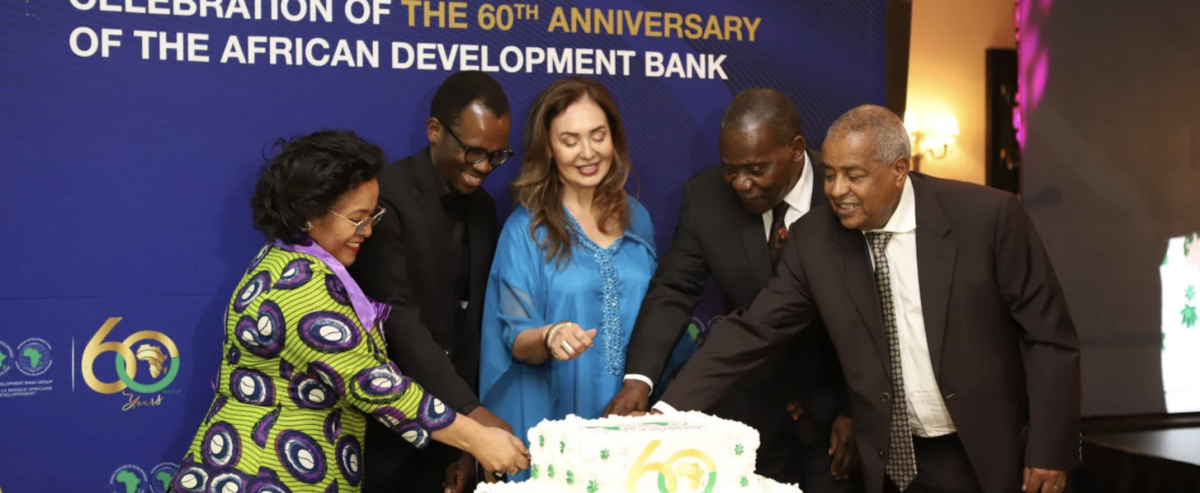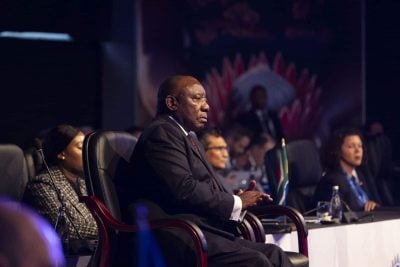This article is part of a series produced in collaboration with the African Development Bank in light of its sixtieth anniversary. Please visit our dedicated portal to read about the Bank's history and its activities on the continent.
The African Development Bank has this year marked its Diamond Jubilee with a series of events around the continent, commemorating 60 years of driving social and economic transformation across Africa. The Southern African regional celebration, held in Johannesburg in December, brought together leaders, stakeholders, and partners to reflect on the institution’s achievements and its vision for a prosperous future. The event not only served as a platform to honour the Bank’s contributions to Africa’s development but also afforded officials of the bank a chance to reaffirm its commitment to fostering progress across the region.
Speaking at the ceremony, Leila Farah Mokaddem, Director General of the African Development Bank Group, stressed the Bank’s enduring legacy of impact.
“Sixty years ago, the African Development Bank was born out of a vision for a better Africa. Today, we celebrate not just numbers but the lives transformed and communities uplifted through our work,” she noted.
With 226 projects in the region, the Bank has invested over $11bn in Southern Africa. Among them is the SADC Sub-Regional Transport and Facilitation Project, a $231.3m investment connecting Malawi and Mozambique that is meant to promote trade and reduce regional fragility. The Lesotho Highlands Water Project, valued at $2.1bn, has enhanced water transfer and hydroelectric power, addressing critical energy security needs. The Kazungula Bridge Project, supported by a $81.6m investment from the Bank, has bolstered connectivity between Zambia and Botswana along the North-South Corridor. Additionally, the Bank recently provided a $1bn sovereign-guaranteed corporate loan to Transnet, facilitating the recovery and growth of South Africa’s freight transport sector.
Also present at the ceremony was South Africa’s minister of finance, Enoch Godongwana, minister of finance, who reflected on the Bank’s contributions to the region and the partnership between his country and the African Development Bank. “The Government of the Republic of South Africa celebrates this significant milestone with the African Development Bank. Our region, and indeed South Africa, continues to enjoy a fruitful partnership with the Bank as we work together toward a shared goal of creating a better Africa for future generations.”
Looking towards the future, Godongwana declared that “as we gather to celebrate the many achievements of our collaborative efforts, we also recognise the need to continue advancing Africa’s development agenda. This milestone energises us and strengthens our commitment to a shared vision for the next 60 years!”
Concurring with Godongwana, Mokaddem invited all partners, including governments, private sector actors, and international institutions, to collaborate with the Bank in building a more inclusive and sustainable Africa. “Our work is far from over,” she said, adding that “together, we can address climate-related challenges and mobilise resources to ensure no one is left behind.”
Under its new Ten-Year Strategy, the African Development seeks to place a strong emphasis on integrated regional projects and climate resilience, with initiatives such as the Lobito Rail Integrated Corridor, which links Angola, the Democratic Republic of Congo, and Zambia, set to boost economic growth, enhance agricultural value chains, and promote investments in renewable energy.
The largest development finance institution in Africa with authorised capital of $318bn and a Triple A rating, the African Development Bank is an indispensable partner for African countries, supporting their economies through interventions in agriculture, manufacturing, energy, infrastructure, trade, health, education and other social services. The bank is also playing a leading role in climate action, directing investments to support member countries’ climate goals.

 Sign in with Google
Sign in with Google 



